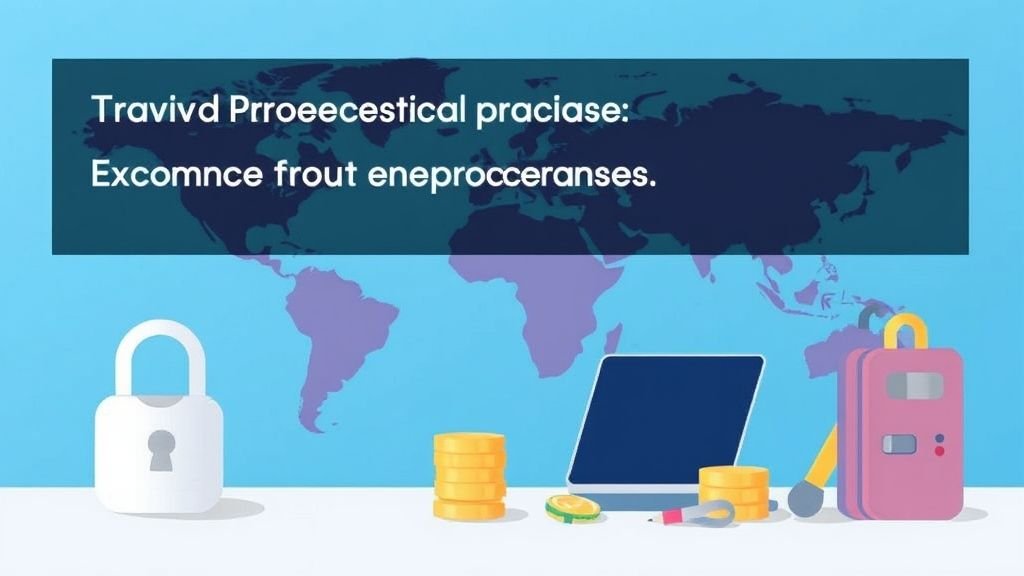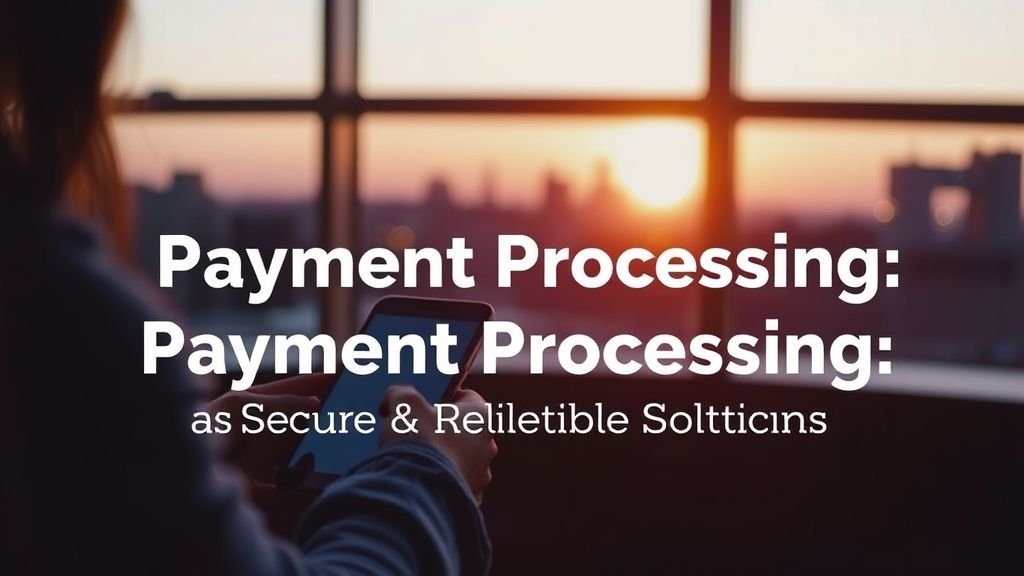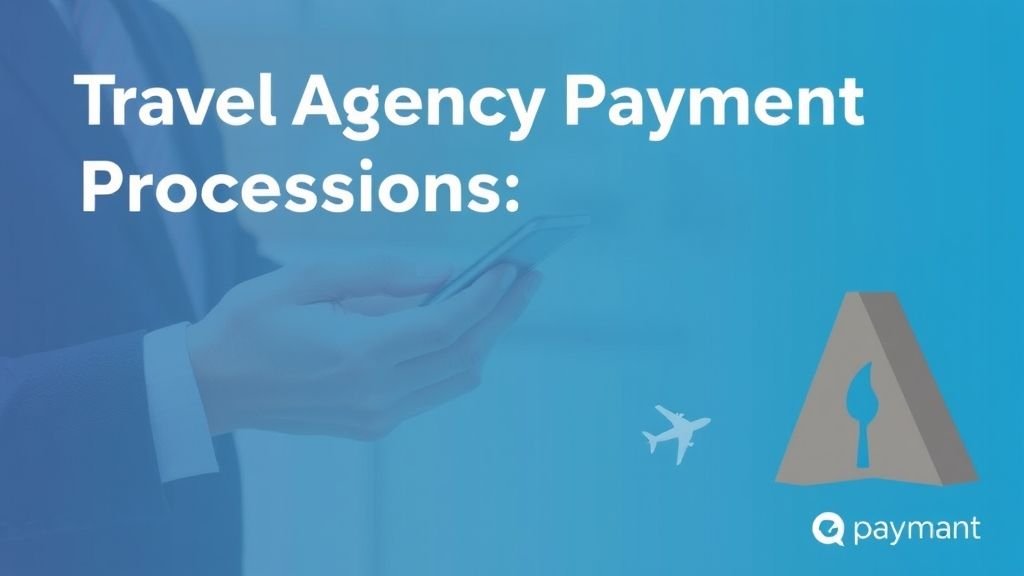Table of Contents
Introduction: Why Travel Agency Payment Processing Matters

In today’s global travel industry, secure and efficient travel agency payment processing is no longer an option—it is an absolute necessity. With thousands of transactions happening daily across flights, hotels, tours, and vacation packages, travel agencies rely on seamless payment systems to keep operations running smoothly. Customers expect quick, safe, and transparent payment experiences, while agencies must protect against fraud, ensure compliance with regulations, and manage international payments in multiple currencies.
Without a reliable system, travel agencies face high chargebacks, transaction delays, and reputational damage. This is why selecting the right payment processing partner is one of the most critical business decisions an agency can make. At TravelPassion.net, we provide insights into the best, most reliable and legal payment solutions that can transform your travel business. Unlike outdated or insecure options, these solutions are designed to offer compliance, scalability, and flexibility, helping agencies stay ahead in a highly competitive market.
Understanding the Basics of Travel Agency Payment Processing
Payment processing refers to the entire workflow of handling transactions between a customer and a travel agency. In the context of travel, it involves more than just charging a credit card. It includes fraud screening, compliance with international financial regulations, multi-currency support, real-time authorizations, secure settlement of funds, and integration with booking systems. A travel agency payment processor acts as the middle layer between customers, banks, and service providers. For instance, when a customer books a flight online, the processor verifies card details, authorizes the transaction with the issuing bank, and then settles funds into the agency’s account.
Some key aspects of payment processing in travel include multi-currency payments, since agencies often serve global customers; fraud prevention tools, because the travel industry is highly vulnerable to fraudulent bookings; chargeback management, which helps agencies protect their margins; and seamless integration with booking engines to ensure smooth customer experiences. For more details on how payment systems impact travel agencies, you can check global payment trends on WorldPay’s official insights.
Challenges Faced by Travel Agencies in Payment Handling
While digital transformation has made it easier to process transactions, travel agencies still face several obstacles when it comes to managing payments. One major issue is that agencies are frequently classified as “high risk” by financial institutions due to high refund rates, cancellations, and fraud. This makes it harder to access affordable processing services. Fraudulent transactions are another challenge, with IATA reporting that airline ticket fraud costs the industry billions every year. Weak verification processes lead to chargebacks and lost revenue.
Chargebacks and refunds themselves are a major headache. Because travel services are often delivered in the future, customers may dispute charges if trips are canceled or expectations are not met. This can cause financial strain and damage an agency’s reputation. In addition, agencies that work with global clients must manage international payments, currencies, and regulations, which adds layers of complexity. On top of that, regulatory compliance is non-negotiable. From PCI DSS compliance for card security to GDPR for data protection, travel agencies need to keep up with evolving requirements. At TravelPassion.net, we regularly highlight how agencies can overcome these challenges with reliable and legal solutions that protect their money, safeguard customer trust, and enhance efficiency.
Benefits of Secure and Legal Payment Solutions
Agencies that invest in robust travel agency payment processing systems gain significant advantages over competitors still relying on outdated methods. Enhanced security is one of the biggest benefits, with PCI-compliant processors encrypting data to reduce cyber risks. This builds customer confidence and protects sensitive information. Higher conversion rates are another advantage, as smooth payment experiences reduce abandoned bookings. Features like saved cards, one-click checkouts, and local currency options encourage more customers to complete their bookings.
Although advanced processors may carry slightly higher fees, they deliver long-term cost savings by reducing fraud and chargebacks. Improved reputation follows naturally—when payments are smooth and trustworthy, clients are more likely to return and recommend the agency. Finally, secure and legal systems allow agencies to reach global markets by supporting diverse payment methods including e-wallets, bank transfers, and even crypto. As shown in TravelPassion.net’s travel agency credit card processing guide, legal and trusted payment solutions empower agencies to scale safely and effectively.
Comparison Table: Traditional Payments vs Modern Travel Agency Payment Processing
| Feature | Traditional Payments | Modern Travel Agency Payment Processing |
|---|---|---|
| Speed of Transaction | Slow (manual settlement, delays) | Instant or same-day processing |
| Fraud Protection | Limited, reactive | Advanced AI-driven fraud detection |
| Global Currency Support | Restricted to local banks | Supports multiple currencies worldwide |
| Customer Experience | Manual input, frequent errors | Seamless, one-click payments |
| Chargeback Handling | Minimal tools | Automated dispute and refund management |
| Integration | Poorly integrated with booking apps | API-based, fully integrated solutions |
| Legal Compliance | Often outdated | Fully PCI DSS and GDPR compliant |
Key Features of the Best Payment Processors for Travel Agencies

Choosing the right travel agency payment processing system requires a deep understanding of the essential features that ensure efficiency, compliance, and customer satisfaction. Not every processor is built for the unique needs of the travel industry, so agencies must prioritize providers that understand high-risk business models and global customer bases.
One of the most important features is multi-currency and multi-language support. Travel agencies cater to international travelers, so being able to accept payments in local currencies not only builds customer trust but also prevents lost sales due to exchange rate confusion. Closely tied to this is dynamic currency conversion, which allows customers to pay in their home currency while the agency still receives funds in its preferred currency.
Another critical feature is fraud detection and prevention tools. Advanced processors use artificial intelligence and machine learning algorithms to detect suspicious behavior in real time. Features like address verification service (AVS), card verification value (CVV) checks, and 3D Secure authentication add an extra layer of protection. Since fraud is one of the travel industry’s biggest challenges, investing in such tools reduces both chargebacks and financial losses.
Seamless integration with booking engines and global distribution systems (GDS) is also non-negotiable. Customers expect to make a booking and payment in one smooth step. Payment systems with API-based integrations ensure that transactions are processed instantly without redirecting clients to third-party websites. This leads to a more professional and trustworthy booking experience.
Lastly, agencies should seek compliance-focused features. A reliable payment processor must be fully PCI DSS compliant, support GDPR standards for data protection, and provide transparent reporting tools. Detailed reporting and analytics help agencies track revenue streams, identify peak booking periods, and monitor fraud attempts. Platforms that offer real-time dashboards give business owners actionable insights to optimize pricing and marketing strategies.
For a closer look at why these features matter, the TravelPassion.net corporate travel savings guide explains how financial efficiency and compliance-driven tools can transform a travel business into a more competitive, profitable operation.
Integration Strategies: Making Payment Processing Work for Agencies
Even with the best processor, success depends on how payment solutions are integrated into an agency’s ecosystem. Poor integration leads to payment errors, longer processing times, and dissatisfied customers. The best strategy starts with evaluating the agency’s existing booking systems, customer relationship management (CRM) platforms, and accounting software. A processor that offers seamless API connections ensures that all these platforms communicate effectively.
For example, a travel agency that uses Amadeus or Sabre GDS should choose a payment processor that provides direct compatibility. This reduces friction by letting customers book flights and pay instantly without system conflicts. Similarly, agencies using cloud-based CRMs like Salesforce benefit from processors that sync data automatically, helping sales teams track leads, completed payments, and abandoned carts.
Another effective strategy is adopting tokenization and recurring billing options. Tokenization replaces sensitive card data with a secure digital token, which can be reused for future transactions. This is particularly valuable for corporate travel clients who book repeatedly and expect a fast checkout process. Recurring billing also works well for subscription-based services, such as loyalty programs or corporate travel retainers.
Travel agencies must also consider omnichannel integration. Modern travelers book across multiple platforms—websites, mobile apps, and even physical offices. A processor that supports omnichannel payments ensures consistency across all booking touchpoints. Customers who start a booking on mobile but complete it on desktop, for instance, should experience a unified payment flow.
Finally, agencies should focus on testing and optimization. Before launching a new payment processor, agencies should run test transactions, simulate chargebacks, and validate refund processes. This helps staff identify weaknesses and ensures that real customers won’t face disruptions. As explained in TravelPassion.net’s guide to melon travel, agencies that embrace digital tools and streamlined integration can build stronger client relationships while minimizing backend inefficiencies.
Reliable and Legal Solutions That Will Change Your Business
The importance of choosing a reliable and legal payment processor cannot be overstated. Many agencies, in an attempt to reduce fees, turn to unverified processors or gray-area providers that lack proper compliance. While these may appear cheaper at first, they expose agencies to security breaches, lawsuits, and even permanent bans from card networks like Visa and Mastercard.
Instead, agencies should focus on providers with a proven reputation. Companies like Stripe, Adyen, and Worldpay are known for supporting high-risk industries with advanced fraud prevention and compliance features. For agencies serving global travelers, PayPal’s Braintree solution offers multi-currency acceptance, while Skrill and Neteller provide e-wallet flexibility for European clients.
Legal solutions also matter for insurance-related travel services. Many agencies work with insurance partners to process add-on services like baggage protection or trip cancellation policies. Using a processor that meets insurance compliance standards ensures smooth handling of these sensitive transactions. TravelPassion.net’s Faye Insurance Travel Agent Login resource offers insights into how legal payment systems integrate with insurance platforms to protect both agencies and their clients.
What truly changes an agency’s future, however, is the ability to scale confidently. Legal, compliant, and reliable payment processors provide the infrastructure to expand globally without fear of penalties or account terminations. They ensure that agencies can accept payments from new markets, protect customer trust, and maintain steady cash flow—all while focusing on growth instead of financial risk management.
FAQs: Everything You Need to Know About Travel Agency Payment Processing

1. Why are travel agencies considered high risk by payment processors?
Travel agencies are classified as high risk because their services are often booked far in advance, which increases the likelihood of cancellations and chargebacks. Additionally, the travel industry has a history of fraud attempts, particularly with airline tickets. These risks make banks and processors more cautious when approving accounts for travel agencies.
2. How can a travel agency reduce chargebacks?
The best way to minimize chargebacks is by using a payment processor that offers fraud prevention tools like 3D Secure, address verification, and real-time risk scoring. Clear terms and conditions, transparent refund policies, and strong customer communication also help. Many agencies now use automated dispute management tools provided by modern processors to contest fraudulent chargebacks efficiently.
3. Which payment methods should a travel agency accept?
To stay competitive, agencies should accept a wide variety of payment methods, including credit and debit cards, e-wallets (like PayPal, Skrill, and Apple Pay), bank transfers, and local payment options popular in target markets. Some forward-thinking agencies are also integrating cryptocurrency payments for tech-savvy customers, though this requires careful compliance checks.
4. What regulations must agencies comply with for secure payments?
The most important regulation is PCI DSS (Payment Card Industry Data Security Standard), which governs how cardholder data is stored and transmitted. Agencies serving European customers must also comply with GDPR for data privacy. Depending on the markets served, agencies may also need to meet standards like PSD2 Strong Customer Authentication in the EU. Choosing a processor that is already compliant with these regulations simplifies operations.
5. How does multi-currency support improve customer experience?
Multi-currency processing allows customers to pay in their local currency, which increases trust and prevents confusion over exchange rates. For example, a customer in Japan booking a trip through a European agency can pay in yen while the agency still receives euros. This convenience reduces abandoned bookings and improves overall satisfaction.
6. Can small travel agencies afford advanced payment processors?
Yes. While enterprise-level processors like Adyen or Worldpay may cater to large agencies, many providers offer scalable pricing models for smaller businesses. Payment gateways such as Stripe and PayPal Braintree allow smaller agencies to pay per transaction rather than committing to high monthly fees. Investing in secure processing saves money in the long run by preventing fraud-related losses.
7. What role does tokenization play in travel agency payments?
Tokenization replaces sensitive card details with unique tokens that can be stored securely for future transactions. This is especially useful for repeat customers and corporate clients who book regularly. It enhances security by preventing hackers from accessing real card details and also improves convenience with faster checkout options.
8. Why should agencies avoid unverified processors?
Unverified or illegal processors may seem attractive because of lower fees, but they pose significant risks. Agencies using such services risk account freezes, legal consequences, and reputational damage if customers’ data is compromised. Working only with verified, compliant processors ensures long-term stability and trust. For examples of compliant solutions, see TravelPassion.net’s reliable credit card processing guide.
Conclusion: Choosing the Smarter Path for Growth

The future of the travel industry depends heavily on secure, efficient, and legal travel agency payment processing. Agencies that continue to rely on outdated or non-compliant solutions put themselves at risk of fraud, chargebacks, and reputational harm. By contrast, agencies that adopt advanced, reliable processors gain the ability to scale globally, protect customer trust, and manage operations with confidence.
From multi-currency support and AI-powered fraud detection to seamless integration with booking systems, the right payment processor goes beyond handling transactions—it becomes a strategic partner for growth. As we’ve explored, solutions from providers like Stripe, Adyen, Worldpay, and Braintree are reshaping the travel industry by delivering compliance, security, and customer satisfaction in one package.
At the same time, agencies must remember that legal compliance is non-negotiable. Following PCI DSS, GDPR, and regional standards ensures long-term sustainability. Customers are far more likely to book with agencies that provide secure and transparent payment experiences.
The message is clear: if you want your travel business to thrive, you must invest in the right payment processing solution. At TravelPassion.net, we continue to share resources that highlight the most reliable and legal services available, ones that truly have the potential to change your life and your business. Whether you’re a small startup agency or an established global brand, secure payment processing is the foundation on which sustainable growth is built.
For further insights on how to optimize travel payments and related services, explore resources like best purses for traveling in Europe, melon travel solutions, and corporate travel savings. These guides work together to provide agencies and travelers alike with the tools and knowledge they need for a seamless travel experience.
By prioritizing secure, efficient, and legal payment systems, travel agencies can unlock their full potential and remain competitive in a rapidly evolving global industry.
